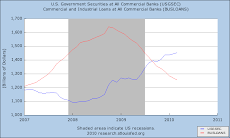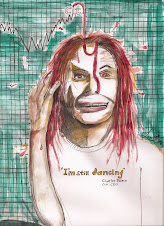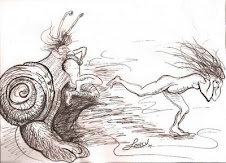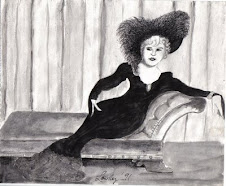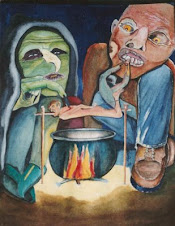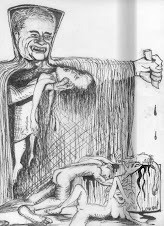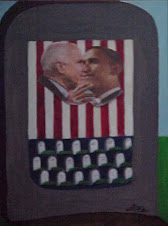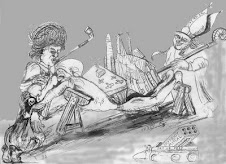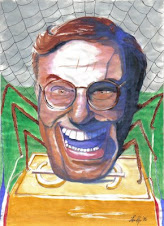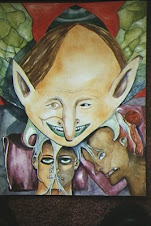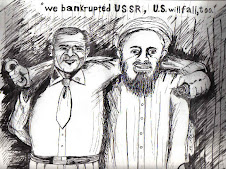 |
| CSA: Criminally Segregated America |
As the resemblance between the methods used by the Communistic Soviets Union and the one Party State in China becomes more and more undeniable, the question for anyone who believes, if not in Fukuyama's "The End of History", at least in the one compelling claim that Democracy has, that of being the most consistent with the requirements of Justice, it seemed to me that it might be a good idea to return to the seminal work on Democracy done by Alexis de Tocqueville, and see if there wasn't somewhere that we went astray.
Tocqueville believed that democratic societies carried with them serious moral and political risks which had to be faced and overcome. As the democratic form of government, Egypt being the centerpiece for the fact that it is non-viable in regions of the world where the Muslim religion dictates that the Muslim religion dictate the movement of all citizens and follow them about throughout the day enforcing its rigid rules, via floggings, beheadings, ostracism and imprisonment, such that, as in Iran, the state of the State is one of subservience to the whims of those who make claims of congress with the supernatural to impose their will on all citizens, much like a one-party system, has become less and less viable as a replacement for the US-backed military dictatorships that ruled the region for decades, it becomes incumbent upon us to investigate not only why it doesn't transplant well to any of the countries in the Mideast, including the pseudo-democracy of Israel, but why, as we're witnessing more and more in the OECD countries as well, it doesn't work, period.
Which isn't to deny that it, in different forms and with different attributes, didn't work in some places to enable a spectacular increase in the standard of living of those who lived under its auspices. Now, it always seemed to me, that of course it worked here, there was so much to steal and the federal government treated the West with much the same attitude that the crown treated its colonies before the first Civil War, usually referred to, less accurately, as The Revolutionary War, before the majority of his English subjects in the colonies decided that they'd had it with The George (no surprise that the eponymous Georgia was the only colony to actually surrender to his highness' forces). Even before independence, the spirit of the colonists was radically different than those of their contemporaries on the Continent, as a perusal of Van Wyck Brooks' "The Flowering of New England" would show, when contrasted with Emil Zola's, "The Earth" which depicts peasant life in rural France, as they highlight the stark difference in attitudes between those living under a democratic government of self-rule, and those existing under a collapsed aristocratic feudalism. The difference was argued as a difference between atomization and centralization and was called "The Great Debate" of the 1820's.
Tocqueville was so taken up with this debate that he wanted to see for himself how the fledgling US managed to balance the two conflicting forces of central power and local autonomy without the existence of an aristocracy. He soon discovered, once he'd left the 'profit-loss' mentality of New York, where the market-place reigned supreme in a hive of frenetic commercial activity, that the West displayed more profoundly the advantages to be had living in a society that lacked class consciousness, the most notable of which was 'the absence of government', by which he meant the absence of the machinery of the state with which he was all too familiar from living in France. It was this vigor of the civil society that convinced Tocqueville that Democracy in America contained an ingredient missing in his own country, and he determined to unearth just what that might be. And it was in studying the flowering institutions of New England that he found what he sought.
He came to believe that it was the autonomy of the townships that fostered the self-reliance and habits of association that were lacking in a France that had killed off its aristocracy leaving the peasants that had depended on it for guidance aboard a ship of state in choppy seas they had no experience navigating. Yet the Americans seemed content to do without government, due, he believed, to the federal system's constitutional rules. Local officials were held to account, not by bureaucrats answerable to Washington (or Paris, the way it was in overly-centralised France), but by local people. It was only when he visited the south that he saw how slavery had created the only approximation to an aristocratic society in all of America. And a very unstable one at that, because the American Southern Aristocracy had none of the feelings of Noblesse Oblige or at least, none of the Oblige part of the equation. Ensconced in their superior social position by virtue of their genetic ascendancy over what they considered an inferior, backward race of savages, the Southern Aristocracy ruled by virtue of one ingredient of legitimacy alone: Power.
But a return to the atavistic forces of slavery were not what Tocqueville came to America to study, but the possibility of expanding representational government from its continental constraints, as Guizot, soon to be France's Prime Minister, was doing in France then what southern Republicans are attempting to do in southern states today: restrict, not expand, the political franchise. In the France of the day, the Doctrinaire's - Guizot, Barante, Royer-Collard - understood how the French state machine had left local government little more than local administrators of centralized authority, with even mayors more answerable to officials in Paris than to their local electorate.
This is the danger that the Confederate flag, gay marriage, and black civil rights poses to Democracy in America now. That Washington, because the south is still very much the south and has no intention on relenting on any of the above issues, is taking the place of Paris in centralizing power by imposing on the south the liberalizing influence of modern thought, whereas they would prefer to act like the Muslims of the Middle east and, via lynchings instead of beheadings, rule by a tyrannical fear to keep their black populations in place: separate and unequal. Because whereas Tocqueville saw the impossibility of restoring the aristocracy to its former rank of privilege without responsibility, southerners see no such thing, a restoration of genetically-based (all aristocratic positions and the monarchies from which they spring, are based on your birth, and are therefore genetically-based) aristocratic privilege, essentially all whites being better than any black person, being what they believe to be a return to the natural order of things.
This is why the Confederacy flag still flies over the State houses and is carried in the back of pick-ups and is a symbol of what Tocqueville saw more than one and a half centuries ago: that the south is not part of the zeitgeist of the United States, it is a land of passive, entitled people who have used the industrial north to reach a level of material well-being they would never have attained without it, but who still feel that they have a right to deny that well-being to a genetically inferior 'race', not because of the simplistic, 'color of their skin', but because they feel that color is merely a marker for a whole panoply of genetic failures that the Negro, to them, epitomizes.
But by imposing the will of the rest of the country onto a south that clearly rejects it, Washington begets tyranny. Putting southern mayors, vis-a-vis Washington, in the same position as those French mayors Tocqueville remonstrated against: more answerable to officials from DC than to their own local electorate. And how do you maintain it's a democracy when you remove one of its essential ingredients? If we wish to help spread democratic institutions to other countries around the globe, it seems to me that we would do well by answering that question before we do so, not let it languish for another couple of centuries.
When "E Pluribus Unum" was replaced by the motto "In god we trust", in the fifities, it indicated a change from the dynamism that Tocqueville was a witness to with the subservient mentality of slaves, a nation feigning to put its trust in a Master it will never see instead of a nation of capable citizens striving to make their great creation function via their own initiative and the bond of brotherhood that the motto "E Pluribus Unum" implies. Thus have we come to where we are now: no Liberté, no égalité, and no Fraternité, just atomized individualists scrabbling against one another for a scrap of material gain. But if that's all that 200 years of democracy buys you, how dare we foist it onto the rest of the world. It doesn't even have legitimacy here.









